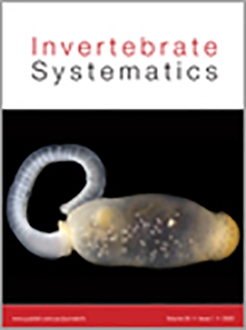Echiura (commonly called spoon worms) are derived annelids that have an unsegmented sausage-shaped body with a highly extensible anterior end (i.e. a proboscis). Echiura currently contains two superfamilies: Echiurioidea (with Echiuridae, Urechidae and Thalassematidae) and Bonellioidea (with Bonelliidae, and Ikedidae). Ikedidae contains only Ikeda, which is distinctive in having a huge trunk, a highly elongate proboscis with stripes or dots, and numerous gonoducts. A recent molecular phylogeny of Echiura recovered Ikedidae as the sister group to Bonelliidae. However, due to relatively low support values for the monophyly of Bonelliidae, this relationship remains problematic. In this study, we reinvestigated the relationship of Bonelliidae and Ikedidae using an expanded dataset with more taxa and genes. In contrast to the previous results, our analyses strongly support that Ikeda is nested within Bonelliidae due to the placement of Maxmuelleria. On the basis of this result, we synonymise Ikedidae with Bonelliidae and transfer Ikeda to the latter, the diagnosis of which is amended. In addition, we synonymise Urechidae with its sister group Echiuridae because they share the synapomorphy of having anal chaetae rings. Furthermore, considering that recent phylogenetic studies have consistently recovered Echiura as the sister group to Capitelliidae within Annelida, we drop the rank of the echiuran clade to family-level and propose a revised classification: Thalassematidae with two subfamilies, Thalassematinae (with two tribes Echiurini and Thalassematini) and Bonelliinae. In addition, we identified a sample collected from the deep sea (∼1820 m) of Monterey Bay, California, based on its molecular data. This terminal unexpectedly formed the sister group to the eight genera of Thalassematini, most members of which are inhabitants of littoral zones.
BioOne.org will be down briefly for maintenance on 17 December 2024 between 18:00-22:00 Pacific Time US. We apologize for any inconvenience.
How to translate text using browser tools
10 February 2020
Phylogeny of Echiura updated, with a revised taxonomy to reflect their placement in Annelida as sister group to Capitellidae
Ryutaro Goto,
James Monnington,
Marija Sciberras,
Isao Hirabayashi,
Greg W. Rouse
ACCESS THE FULL ARTICLE
<
Previous Article
|

Invertebrate Systematics
Vol. 34 • No. 1
February 2020
Vol. 34 • No. 1
February 2020
Bonelliidae
Dwarf males
Ikedidae
sexual dimorphism
spoon worm
Thalassematidae





